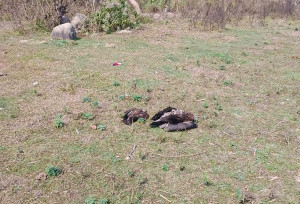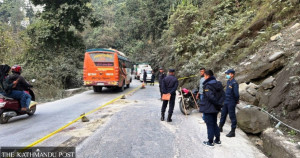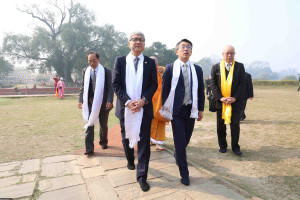Lumbini Province
Province 5 government fails to conserve Buddha-era lake
Human activities—particularly fishing—have defiled the sacred lake, say locals..jpg&w=900&height=601)
Manoj Paudel
A week ago, Priyanka Kurnagal of Sri Lanka visited Sagarhawa Lake, a historic site in Jagadishpur of Kapilvastu district. Kurnagal was excited to visit the place, which is a major attraction for Buddhists from around the world. However, upon arrival, she was taken by surprise to see that the sacred site turned into a fishery, with locals setting fishing traps all over the lake.
Another visitor from Cambodia, Lensen Howe, was also disheartened by the scenes he encountered at the lake, where people were netting and killing fishes. Many Buddhist worshippers have expressed similar sentiments after visiting the Buddha-era lake that is spread over an area of about 100 bighas. The then Niglihawa VDC had leased the lake to Bijay Khanal, a local, on a contract basis for five years to operate a fishery.
Despite repeated complaints from locals demanding an end to fishing in the lake, the concerned authorities tasked with the preservation of the lake have turned a blind eye to the water body’s degradation. However, with the provincial government directing the Lumbini Development Trust with the task of conserving and promoting the lake area, the 2,600-year-old lake that holds historical and archaeological importance is heading to become a no-fishing area.
The Sagarhawa Lake area has been one of the pilgrimage sites for Buddhist devotees for a long time. According to archaeologist Basant Bidari, the lake has been mentioned in Chinese and Buddhist scriptures where they talk of the slaughter of 9,999 Shakyas. It is believed that the slaughter site is the present Sagarhawa, and because of the unpleasant incident that occurred in the past, Buddhist pilgrims visit the lake to pray for the loved ones whom they lost untimely.
Himal Upreti, an archaeological officer at the Trust, said that fishing activities at the holy site have defiled the historic lake.
“These sort of activities affect the archaeological aspect of the site,” said Upreti. “Items of historical significance can sustain damage and also be lost in the water because of unnecessary human activities.”
Earlier in 2015/16, locals had filed a complaint at the District Administration Office against the handing over of the contract to Khanal. However, the authorities failed to take any action. The Lumbini Development Trust, which was tasked with the conservation of the Sagarhawa Lake, also failed to deploy officials to curb the illegal activities, stating that the Trust was not given the jurisdiction to carry out conservation works at the lake area.
The Trust was formed in 1985 as provisioned by the Lumbini Development Trust Act 1985 to implement Lumbini Master Plan and explore, excavate and conserve archaeological sites scattered in Kapilavastu, Rupandehi and Nawalparasi districts.
Last week, on December 15, a decision by the Province 5 Ministry of Industry, Tourism, Forest and Environment entrusted the Trust with the conservation and promotion of the lake.
“Earlier, the lake area was not under our jurisdiction,” said Saroj Bhattarai, acting member secretary of the Trust. “We had stopped fishing activities in the lake last year, but we failed to follow up on the matter after that. Now, we have the authority to permanently put a stop to all fishing activities at the lake.”
Bhattarai said the Trust is currently preparing a plan to preserve the lake site.
“We will fix the signboards and boundary wires, and initiate a drive to clean and clear the shrub-covered areas,” he said.




 16.96°C Kathmandu
16.96°C Kathmandu















